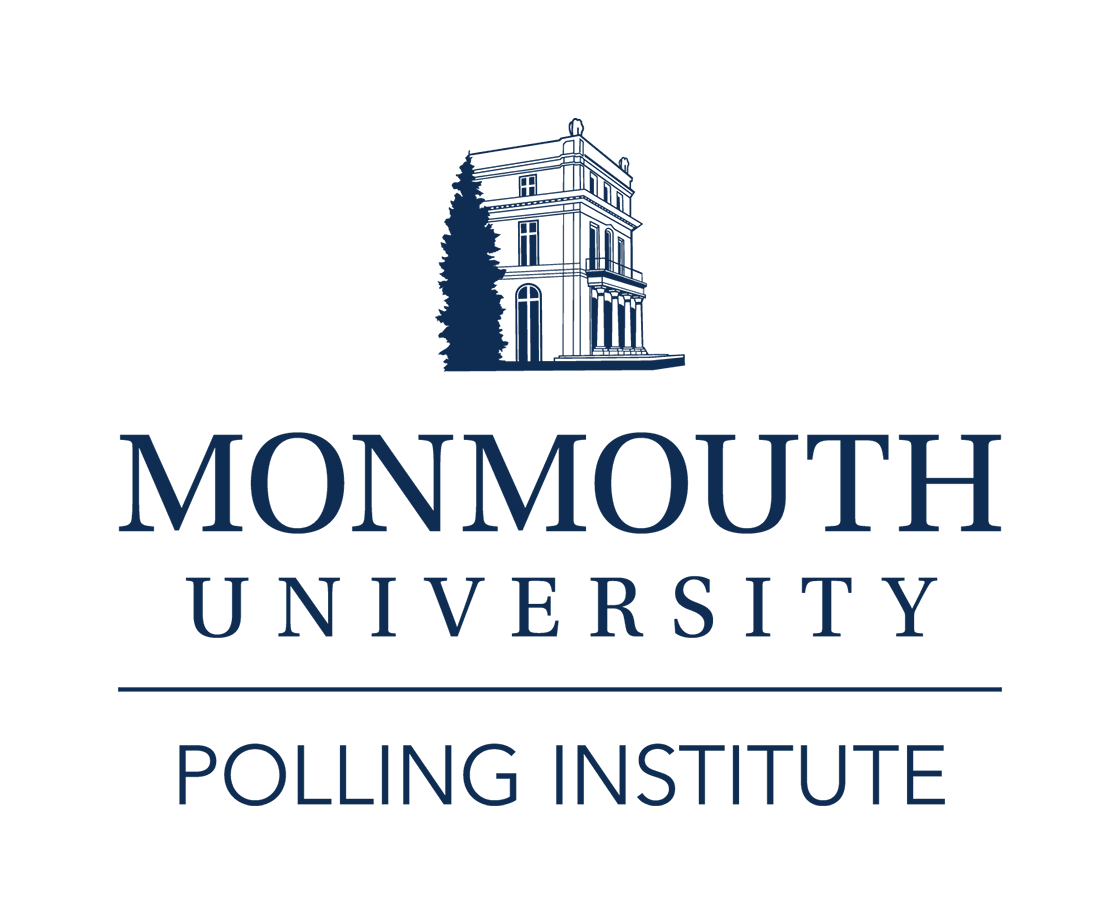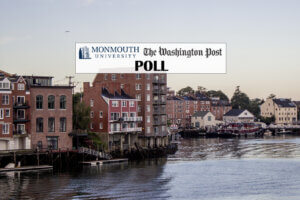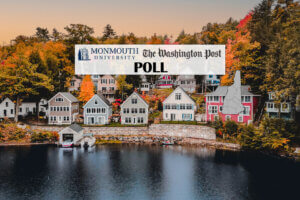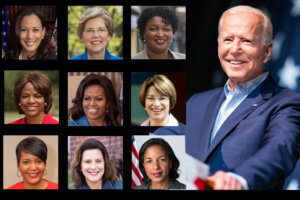West Long Branch, NJ – Bernie Sanders holds a 7 point lead over Hillary Clinton among likely voters in New Hampshire’s first in the nation primary. Granite State Democrats are basically satisfied with the nomination process and the latest Monmouth University Poll finds that few would be particularly upset if their chosen candidate did not end up with the nomination. Just 1-in-4 feel that Clinton is actively trying to avoid participating in debates with her fellow candidates.
In Monmouth’s first poll of the 2016 New Hampshire Democratic primary, Bernie Sanders is supported by 43% of likely voters to 36% for Hillary Clinton. Unannounced candidate Joe Biden holds 13%, with 2% supporting Martin O’Malley and 1% each for Lincoln Chafee, Larry Lessig, and Jim Webb. When the second choices of current Biden supporters are reallocated, Sanders still leads Clinton by 7 points, 48% to 41%.
In what may surprise some observers, Sanders has an advantage over Clinton among both men (44% to 34%) and women (42% to 38%) in the New Hampshire primary. Sanders leads Clinton among voters under 50 years old by 46% to 35% and voters age 50 to 64 by 44% to 34%, while Clinton edges Sanders by 42% to 35% among those age 65 and older.
The partisan composition of the electorate will have an impact on the outcome since New Hampshire allows same-day registrants and those with no party declaration to participate in primaries. Currently, Clinton has a slight 43% to 39% edge over Sander among registered Democrats, while Sanders holds a sizable 49% to 26% advantage among registered independents and new voters.
“Sanders has certainly cut into Clinton’s core constituencies, but his ultimate success may ride on how many new voters he can get to the polls,” said Patrick Murray, director of the independent Monmouth University Polling Institute in West Long Branch, NJ. “Either way, it looks like most Democratic voters will be able to live with however this nomination contest turns out.”
Just 1-in-5 (19%) Democrats say they would be very unhappy if someone other than their chosen candidate won the party’s nomination. Another 23% would be a little unhappy, while fully half (50%) say they would be okay with whoever won the campaign. Among Clinton voters, only 19% would be very unhappy if she did not win, 21% would be a little unhappy, and 51% would be okay with another candidate taking the nomination. Among Sanders voters, just 19% would be very unhappy if he did not win, 29% would be a little unhappy, and 44% would be entirely okay with a different outcome.
The poll also found that Democratic primary voters in New Hampshire are much more satisfied with their party as a whole than their Republican neighbors are. Fully two-thirds (66%) of Democrats are satisfied with their party’s leaders in Congress and just 33% are dissatisfied. The Monmouth poll released yesterday shows the exact opposite opinion among Granite State Republicans – just 33% are satisfied with the GOP leadership in DC and 66% are dissatisfied.
In this environment, Democrats are much more likely than Republicans to value political experience over outsider status for their next president. More than 6-in-10 (62%) Democratic primary voters say that the country needs a president with government experience who knows how to get things done, compared to just 23% who prefer someone from outside government who can bring a new approach to Washington. This is the exact opposite of opinion among New Hampshire Republicans, 68% of whom want the next president to have no political résumé and just 23% who value government experience.
“As a career-long independent and ranking member of the Senate budget committee, Sanders possesses the combination of new ideas and Washington know-how that Democratic voters see as a positive,” said Murray. “Given Democrats’ satisfaction with their party and the option offered by Sanders, there just isn’t much room in this race for an outsider like Lessig.”
Some national and local party leaders have complained that there will not be enough debates among the Democratic candidates, especially before the first contests in February. New Hampshire primary voters are divided – 43% say there are enough debates scheduled before February and 36% say there are not, with 19% having no opinion. While some have claimed that the party’s leadership is limiting debates to help Hillary Clinton, just 23% think that Clinton is actively trying to avoid having more debates. Another 41% say she is not avoiding more debates and 36% have no opinion.
Looking at the candidates’ fundamental strengths, Bernie Sanders holds the highest personal rating among New Hampshire Democrats at 83% favorable to 7% unfavorable. Joe Biden has a similar rating of 80% favorable to 7% unfavorable. Hillary Clinton’s rating is also high at 77% favorable to 17% unfavorable. The other declared candidates are unknown by more than 6-in-10 primary voters. This includes, Lincoln Chafee at 22% favorable to 18% unfavorable, Martin O’Malley at 23% favorable to 13% unfavorable, Jim Webb at 15% favorable to 13% unfavorable, and newcomer Larry Lessig at 12% favorable to 12% unfavorable.
The Monmouth University Poll was conducted by telephone from September 10 to 13, 2015 with 400 New Hampshire voters likely to vote in the Democratic presidential primary. This sample has a margin of error of ± 4.9 percent. The poll was conducted by the Monmouth University Polling Institute in West Long Branch, NJ.
DATA TABLES
The questions referred to in this release are as follows:
(* Some columns may not add to 100% due to rounding.)
1. Who would you support if the presidential primary was being held today and the candidates for the Democratic nomination were – [NAMES WERE ROTATED]?
| Sept. 2015 | |
| Joe Biden | 13% |
| Lincoln Chafee | 1% |
| Hillary Clinton | 36% |
| Martin O’Malley | 2% |
| Bernie Sanders | 43% |
| Jim Webb | 1% |
| Larry Lessig | 1% |
| (VOL) Other | 1% |
| (VOL) Undecided | 3% |
| (n) | (400) |
2. And who would be your second choice?
| Sept. 2015 | |
| Joe Biden | 18% |
| Lincoln Chafee | 1% |
| Hillary Clinton | 31% |
| Martin O’Malley | 3% |
| Bernie Sanders | 21% |
| Jim Webb | 1% |
| Larry Lessig | 0% |
| (VOL) Other | 0% |
| (VOL) No one | 14% |
| (VOL) Undecided | 10% |
| (n) | (400) |
[QUESTION 3 WAS ASKED OF THOSE WITH A FIRST CHOICE, moe = +/-5.0%.]
3. How would you feel if someone other than [FIRST VOTE CHOICE] won the Democratic nomination – would you be very unhappy, a little unhappy, or would you be okay with it?
| TOTAL | Clinton voters | Sanders voters | Biden voters | |
| Very unhappy | 19% | 19% | 19% | 20% |
| Little unhappy | 23% | 21% | 29% | 12% |
| Okay with it | 50% | 51% | 44% | 62% |
| (VOL) Depends | 7% | 9% | 8% | 4% |
| (VOL) Don’t know | 1% | 1% | 1% | 1% |
4. I’m going to read you a few names of people who are running or might run for president in 2016. Please tell me if your general impression of each is favorable or unfavorable, or if you don’t really have an opinion. [NAMES WERE ROTATED]
| Favorable | Unfavorable | No opinion | |
| Vice President Joe Biden | 80% | 7% | 14% |
| Former Rhode Island Governor Lincoln Chafee | 22% | 18% | 61% |
| Former Secretary of State Hillary Clinton | 77% | 17% | 7% |
| Former Maryland Governor Martin O’Malley | 23% | 13% | 64% |
| Vermont Senator Bernie Sanders | 83% | 7% | 10% |
| Former Virginia Senator Jim Webb | 15% | 13% | 72% |
| Law professor Larry Lessig | 12% | 12% | 76% |
5. Regardless of who you support, what do you think the country needs more in the next president: someone with government experience who knows how to get things done OR someone outside of government who can bring a new approach to Washington? [CHOICES WERE ROTATED]
| TOTAL | |
| Someone with government experience | 62% |
| Someone outside of government | 23% |
| (VOL) Both | 11% |
| (VOL) Don’t know | 5% |
6. How satisfied are you with the Democratic leaders in Congress – are you very satisfied, somewhat satisfied, somewhat dissatisfied, or very dissatisfied?
| TOTAL | |
| Very satisfied | 11% |
| Somewhat satisfied | 55% |
| Somewhat dissatisfied | 25% |
| Very dissatisfied | 8% |
| (VOL) Don’t know | 2% |
7. Based on what you have heard, will there be enough or not enough debates with the Democratic candidates before voting starts in February?
| TOTAL | |
| Enough | 43% |
| Not enough | 36% |
| (VOL) Too many | 2% |
| (VOL) Don’t know | 19% |
8. Do you think Hillary Clinton is or is not trying to avoid having more debates?
| TOTAL | |
| Is trying | 23% |
| Is not trying | 41% |
| (VOL) Don’t know | 36% |
The Monmouth University Poll was sponsored and conducted by the Monmouth University Polling Institute from September 10 to 13, 2015 with a statewide random sample of 400 New Hampshire voters drawn from a list of registered Democrats and independent voters who participated in a primary election in the past two election cycles or voted in both the 2012 and 2014 general elections, and indicate they will vote in the Democratic presidential primary in February 2016. This was supplemented by a sample of non-voters who say they are likely to register and vote in the Democratic primary. This includes 304 contacted by a live interviewer on a landline telephone and 96 contacted by a live interviewer on a cell phone, in English. Monmouth is responsible for all aspects of the survey design, data weighting and analysis. Final sample is weighted for age and gender based on state registration list information on the pool of voters who participate in primary elections. Data collection support provided by Braun Research (field) and Aristotle (voter list and non-voter sample). For results based on the total sample, one can say with 95% confidence that the error attributable to sampling has a maximum margin of plus or minus 4.9 percentage points (unadjusted for sample design). Sampling error can be larger for sub-groups (see table below). In addition to sampling error, one should bear in mind that question wording and practical difficulties in conducting surveys can introduce error or bias into the findings of opinion polls.
POLL DEMOGRAPHICS (weighted) | |||
| 62% Reg Dem | 42% Male | 9% 18-34 | 95% White, non-Hispanic |
| 27% Reg Ind | 58% Female | 26% 35-49 | 5% Other |
| 11% New voter | 40% 50-64 | ||
| 25% 65+ | |||
Click on pdf file link below for full methodology and results by key demographic groups.




